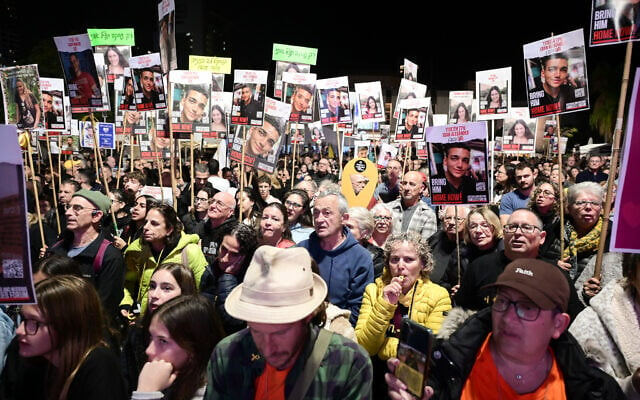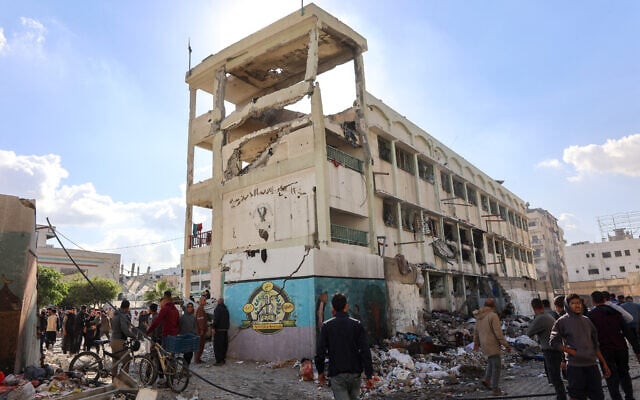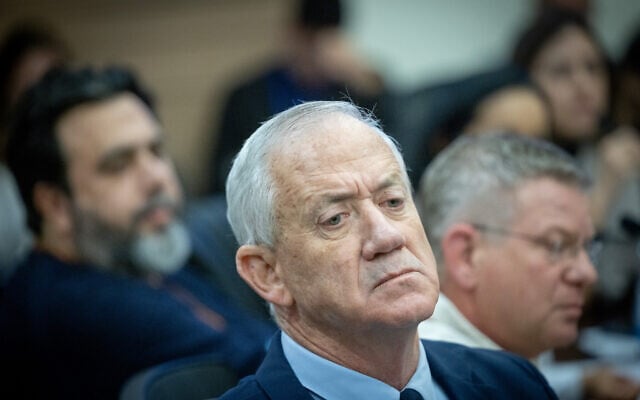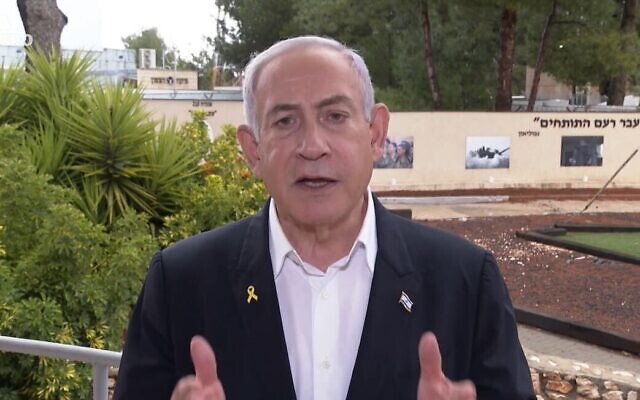



As working groups continued their efforts in Qatar to hammer out a hostage and ceasefire deal in the Gaza Strip, an Israeli official told The Times of Israel on Sunday that Hamas has provided signs of life for several captives.
Israel knows the whereabouts of most of the hostages, the official said, declining to say whether the Palestinian terror group has provided a list of living hostages it is holding.
The official added that Israel would not accept an end to the war as part of a deal, but instead would agree to something along the lines of a “prolonged ceasefire.”
The Israeli negotiating team remained in Qatar on Sunday, where they have been for over a week, Hebrew media reported.
Egypt’s Al-Ghad outlet reported on Sunday said that Israel has requested the inclusion of 11 men on the list of hostages to be released in the first phase of a potential deal, with Hamas apparently demanding further compensation in return for setting them free.
According to the report, the first phase of the potential deal between Israel and Hamas will see 250 Palestinian security prisoners released from Israeli prisons in exchange for the children held in Gaza, the five female soldiers, and the older and sick captives.
While not specifically mentioned by the report, it is assumed that the first round of releases will also include the female hostages who are not serving in the military, as well as elderly and sick captives.
According to the report, Israel has requested the release of 34 hostages in the first phase, including 11 considered by Hamas to be soldiers. The terror group classifies all Israeli men of fighting age to be soldiers.
However, Al-Ghad said Hamas has agreed for the 11 men to be included in the first phase in return for “special consideration” in the deal, implying that Palestinian prisoners who also do not fit the agreed-upon categories could be released.

Hamas-led terrorists kidnapped 251 people during their murderous onslaught through southern Israel on October 7, 2023, including soldiers from IDF bases along the border, partygoers from a music festival and families snatched from their homes.
Ninety-six of those hostages remain in Gaza, including the bodies of at least 34 confirmed dead by the IDF.
A BBC report on Sunday added to the Egyptian report, saying that while key issues remain unresolved, including who will control the Philadelphi Corridor on the Gaza-Egypt border, negotiations are “90 percent completed,” according to a senior Palestinian official involved in the discussions.
The official also said that talks in Doha were discussing the potential creation of a buffer zone along Gaza’s border with Israel that would be several kilometers wide and have an Israeli “military presence.” Once these issues are resolved, a potential ceasefire could begin within days, the official told the BBC.

The report also said that the deal would see 500 humanitarian aid trucks enter Gaza per day.
The report continued a trend in which Palestinian and American officials have expressed far greater optimism regarding the talks than Israeli officials, who have said a potential deal is weeks away at the least and that big gaps remain.
According to Channel 12 news, incoming US President-elect Donald Trump has conveyed to Israel that his incoming administration will not demand as much aid entry into Gaza compared to what President Joe Biden has, and that the limited restriction imposed on US arms supplies to Israel would be lifted.
Channel 12 also reported that Jake Sullivan, the US national security adviser, told Israeli officials during his visit to Israel earlier this month that he “fears the politicization of relations between the United States and Israel,” adding that criticism of US policy by the Israeli government is “damaging relations between the countries.”

Sullivan reportedly added that Biden was “great” for Israel, and that Israel should not act like the US “tried to make life hard” for Israel after the October 7 onslaught, saying that the politicization of Israel-US ties would harm future relations with the Democratic Party.
Against the backdrop of the ongoing negotiations, Prime Minister Benjamin Netanyahu and his former war cabinet minister and now opposition lawmaker Benny Gantz got into a war of words Sunday over the premier’s management of the talks.
Gantz accused Netanyahu of “sabotaging” the negotiations with his Wall Street Journal interview, in which he again said that he was “not going to agree to end the war before we remove Hamas.”
Eliminating Hamas’s military and governance capabilities is one of the war’s stated goals, but the government has refused to say who it envisions will replace Hamas. It has ruled out involvement by the Palestinian Authority, and far-right ministers have been campaigning for Israel to impose military rule over the territory.
Israel is currently in the middle of a “sensitive” period but “Netanyahu is once again running to the foreign media and talking,” charged Gantz, the National Unity party chairman, predicting that “once again a ‘political figure’ will be briefing [reporters] at the end of the week.”
That appeared to be a reference to anonymous briefings — widely presumed to be by the premier himself — that were given at pivotal moments in past negotiations over the past year and that reiterated uncompromising demands — sometimes introducing entirely new demands — that critics saw as undermining the talks.
After joining an emergency wartime government days after the unprecedented Hamas attack, Gantz returned to the opposition in June, accusing Netanyahu of political maneuvers in the managing of the war and citing a breakdown of trust.

“Netanyahu, you do not have a mandate to thwart the return of our hostages again for political reasons,” Gantz added in his Sunday statement. “You said in The Wall Street Journal that Hamas should not rule Gaza because it is 30 miles from Tel Aviv. So let me remind you: Hamas should not rule Gaza because it is two kilometers from Nir Oz and Be’eri, and four kilometers from Sderot. Their security must be restored, and the hostages who were taken from their beds there must be returned.”
Sderot, Kibbutz Nir Oz and Kibbutz Be’eri are among the Israeli communities that were hit the hardest during the October 7 assault.
Netanyahu’s office then slammed Gantz, saying: “The submissive Gantz, who requested an end to the war even before entering Rafah, cannot preach to Prime Minister Netanyahu about the need to eliminate Hamas and the sacred mission of returning our hostages.”
“It is no coincidence that since Gantz left the government for political reasons, the prime minister has struck a fatal blow to Hamas, crushed Hezbollah, and taken direct action against Iran, moves that led to the fall of the Assad regime in Syria,” the Prime Minister’s Office (PMO) claimed in a statement, adding that “those who are not helping the national effort should at least do no harm.”

Gantz’s office then responded to the PMO’s attack: “Netanyahu, don’t be a serial coward. You were afraid to break up the coalition, and Gantz’s insistence alone has already brought back over 100 hostages.”
“You trembled at the possibility of launching a campaign in the north to return the residents to their homes by September 1 when Gantz pushed you to do so. You know very well that if the situation had not been forced upon you, you would never have done so,” it continued.
“Netanyahu, you have already sabotaged the possibility of reaching a hostage deal in the past for fear of breaking up the coalition. We will not allow you to do this again when there is a real deal on the table. Netanyahu, stop being afraid.”
The far-right flank of the coalition has expressed opposition to any deal that ends the war, and threatened to bring down the government and call early elections if one was signed.
